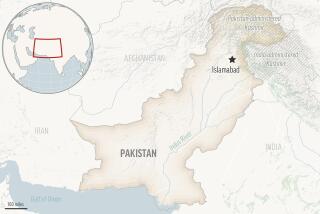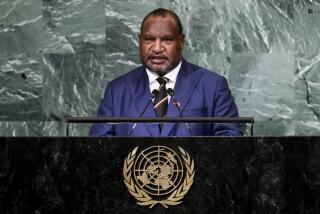Pakistan blast targets tribal elders allied against Taliban
- Share via
ISLAMABAD, PAKISTAN — In a blow to hopes that tribal leaders will prove a potent new ally in the fight against Islamic insurgents, a suicide bomber struck an anti-Taliban gathering of tribal elders Friday, killing at least 30 people and injuring about 100 others.
The attack on the tribal council took place in Orakzai, normally a relatively quiet corner of the nation’s restive tribal areas. It is located about 60 miles southwest of Peshawar, the main city in Pakistan’s volatile northwest.
Hundreds of people had gathered for the outdoor meeting in the remote village of Ghiljo, at which elders of the Alizai tribe were making plans to raise a fighting force and attack a base belonging to the militants.
Pakistani authorities have been providing tribal leaders in such villages with financial and logistical support to raise lashkars, or local militias, in a bid to counter the tightening grip of Islamic militant groups in the tribal areas along the Afghan border.
The tribe had already organized some smaller attacks against the Taliban in recent days, including the burning of two compounds occupied by insurgents.
Witnesses said the bomber rammed his car into the crowd, crushing some people, and then set off his explosives with a thunderous boom. The dead and injured lay clustered in heaps, and area clinics were swiftly inundated with the wounded.
It was the second attack in recent days on anti-Taliban tribal leaders. Authorities on Thursday recovered the decapitated bodies of four men from the Bajaur tribal agency who were believed to have been abducted by militants. The four were helping organize a tribal militia.
Pakistan’s new government, which took office in March, has been struggling to formulate a comprehensive policy for confronting the insurgents, whose unrelenting campaign of suicide bombings has set Pakistani cities and towns on edge.
Military officials and policymakers alike have expressed the belief that military force alone cannot subdue fighters linked to the Taliban and Al Qaeda, who are deeply ensconced in the tribal areas. They believe that enlisting the help of local elders will lend credibility and build support for what has so far been an unpopular offensive by Pakistani government troops.
But tribes that throw in their lot with the government are highly vulnerable to retribution by the militants, even if the army takes steps to protect them. Hundreds of tribal and community leaders considered to have allied themselves with Pakistani authorities have been slain by militants in the last two years.
“Anyone who is organizing against them is a target,” said Rahimullah Yusufzai, a Peshawar-based journalist and analyst of tribal affairs. “It’s an extremely dangerous situation.”
Across the border in Afghanistan, U.S. military officials have also expressed hopes that tribally based militias could be empowered to play a key role in confronting Taliban fighters.
Western troops, thinly spread out across the country, have been struggling to contain the insurgency. But officials acknowledge that the tactic of arming tribal militias has its pitfalls, including the risk of undermining the central government’s authority and of providing weapons to tribes that would then re-ally themselves with the insurgents.
--
Special correspondent Zulfiqar Ali in Peshawar contributed to this report.
More to Read
Sign up for Essential California
The most important California stories and recommendations in your inbox every morning.
You may occasionally receive promotional content from the Los Angeles Times.










